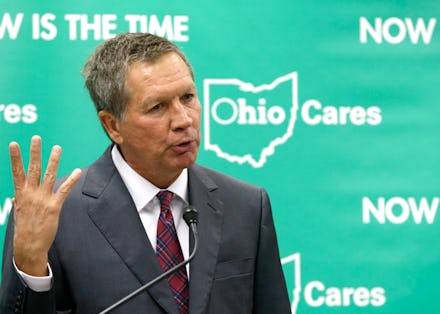What I Say to the Anti-Union Governor Who Just Cost 1,000 Workers Their Jobs

Around 1,000 workers recently lost their jobs at an Ormet aluminum plant in southeastern Ohio; the plant was closed after state utility regulators turned down Ormet’s proposed plan for reducing electricity costs. The plant’s closing will likely have a significant negative impact on the economy of southeastern Ohio since it was once the largest private employer in the region.
Ohio Governor John Kasich, who ran on a platform of job creation, has done nothing to prevent Ormet from closing. Gov. Kasich did not try to negotiate with the Public Utilities Commission of Ohio (PUCO), the organization that denied Ormet’s request for an energy transition plan that would have kept the plant open. It should be mentioned that four of the five members of PUCO’s board were appointed by Kasich. Gov. Kasich refused to meet with the Monroe County Commissioner to discuss how to save the jobs, and even tried to pressure other states, like West Virginia, to not help the Ormet plant.
So why would Ohio’s governor not even try to save the Ormet jobs? The answer? Unions. John Kasich dislikes unions and has made this sentiment very clear. In 2011, Gov. Kasich championed an Ohio Senate bill that would have restricted collective bargaining rights for over 360,000 public employees. The ballot referendum did not pass, but Kasich’s intent to gut unions was made very clear.
Although Kasich’s anti-union politics are prevalent, the laid-off steelworkers are not going down without a fight. The United Steelworkers union (USW) recently launched a campaign to help restore the Ormet jobs. The campaign, "Save Ohio Jobs," is pressuring Gov. Kasich to negotiate with PUCO and American Electric Power to save the plant and the jobs. Despite this effort, Ormet remains closed and many workers are still jobless.
Tom Welch, an Ormet worker who was laid off, put the troubling situation in perspective during a recent appearance on The Ed Show. Welch explained that families of the laid-off workers would likely be forced to "move, retire, [and] lose everything they worked for." Welch added that many of the workers are older, which makes it difficult for them to be trained to work new jobs.
What Welch spoke of is the unfortunate reality for experienced plant and factory workers who have been forced to uproot themselves after lockouts and closings. In 2006, about 300 mining workers from a town just an hour from the Ormet plant faced a lockout that put many of them out of work for almost six months.
One of those workers was my father, who at the time was in his early 50s and the sole provider for our family. My father applied for several jobs in the same field of work, but was turned down due to his age and because he would have needed training. The reality that my father faced seven years ago is the same reality that many of the Ormet workers currently face. Many of the workers cannot simply find new work somewhere else. Working in an aluminum plant is a physically demanding job, and many of the Ormet workers like Welch cannot expect to find a brand new career.
It is not much of a reach to suggest that Gov. Kasich is trying to put his anti-union agenda into practice by not supporting the workers. Regardless, the fact remains that nearly 1,000 workers are now jobless and Kasich has done nothing to stop it.